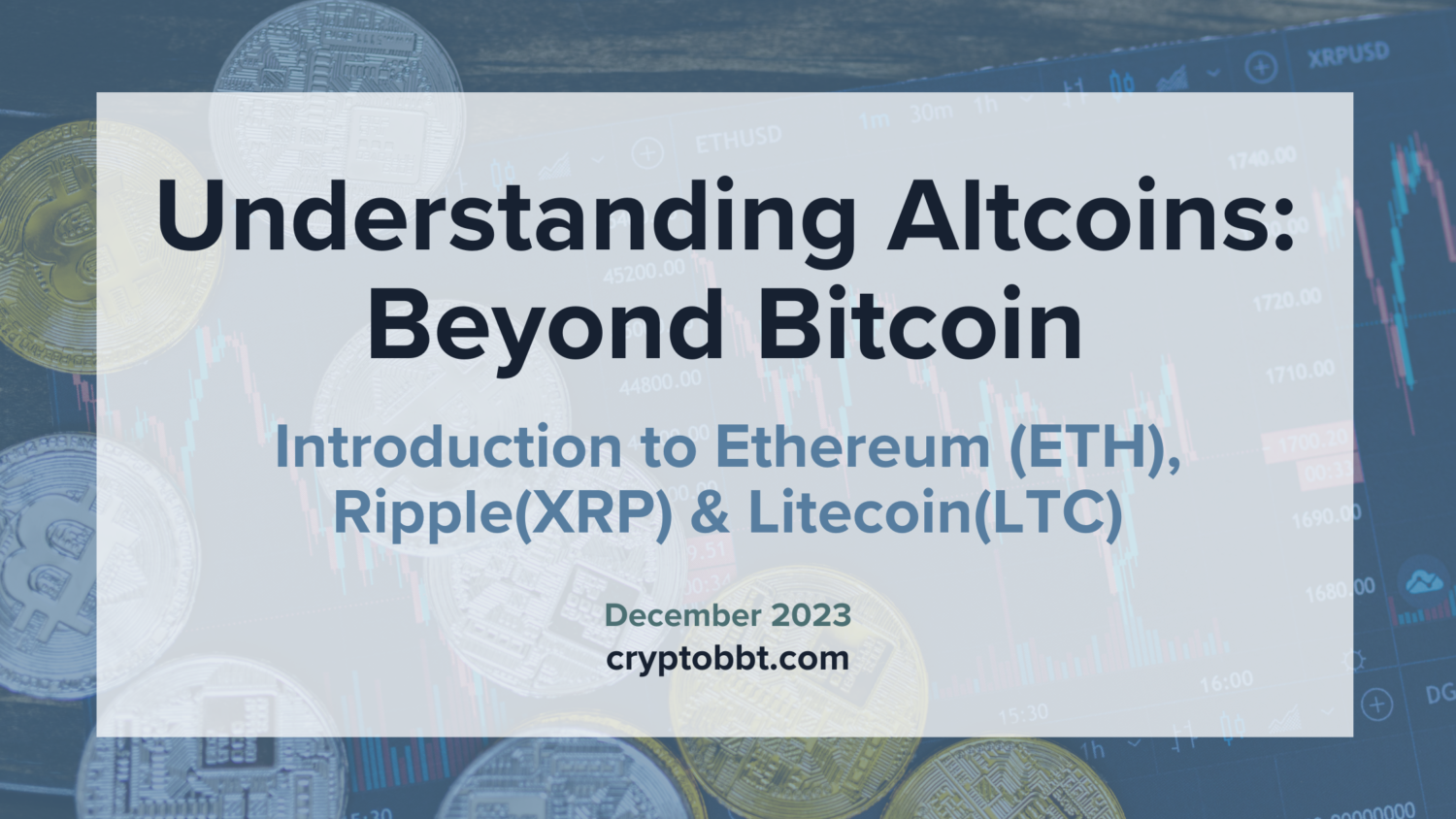Contents
Understanding Altcoins: Beyond Bitcoin 🌈💡
Today, we embark on a journey beyond Bitcoin into the vast and diverse landscape of alternative cryptocurrencies, commonly known as altcoins.
The Altcoin Universe
While Bitcoin is the pioneer and flag-bearer of cryptocurrencies, the altcoin ecosystem encompasses many emerging digital assets.
An “altcoin” is essentially any cryptocurrency other than Bitcoin.
These coins present a spectrum of innovations, offering features and functionalities that extend beyond Bitcoin’s capabilities.
What’s in this guide
In this guide for beginners, we’ll unravel the mysteries of altcoins, exploring their unique characteristics, key differences from Bitcoin, and shining a spotlight on popular players like Ethereum, Ripple, and Litecoin. So, fasten your seatbelts as we navigate the exciting world of altcoins.
Key Differences from Bitcoin
1. Diverse Use Cases
Unlike Bitcoin, which primarily functions as a digital currency, altcoins often serve diverse purposes. Some focus on smart contracts and decentralized applications (Ethereum), others on fast and low-cost transactions (Litecoin), and some on bridging traditional and digital currencies (Ripple).
2. Mining Algorithms
Bitcoin’s proof-of-work (PoW) mining algorithm, SHA-256, is not a one-size-fits-all solution. Altcoins may employ different mining algorithms, such as Scrypt (Litecoin) or Ethash (Ethereum), tailoring their consensus mechanisms to specific goals.
3. Blockchain Technology
While Bitcoin operates on a blockchain, so do altcoins, but with unique features. Some leverage smart contracts (Ethereum), while others focus on scalability (Litecoin) or consensus mechanisms (Ripple’s XRP Ledger).
Altcoins in the Spotlight: Ethereum, Ripple, and Litecoin 🔦🌟
Ethereum (ETH): The Smart Contract Pioneer 🌐📄
Overview: Ethereum is more than just a digital currency; it is a decentralized platform enabling the creation of smart contracts and decentralized applications (DApps).

Key Features:
- Smart Contracts: Ethereum’s blockchain allows for self-executing smart contracts, coded agreements that automatically execute when predefined conditions are met.
- Decentralized Applications (DApps): Developers can build a variety of applications, from decentralized finance (DeFi) platforms to digital collectibles, on the Ethereum network.
Why Ethereum: Ethereum’s versatility has made it a playground for developers, giving birth to a myriad of projects and innovations.
Ripple (XRP): Bridging the Financial Gap 🔄💸
Overview: Ripple is a digital payment protocol designed for fast and cost-effective cross-border transactions.

Key Features:
- Fast Transactions: Ripple facilitates near-instantaneous transactions, making it a compelling choice for international money transfers.
- XRP Ledger: Ripple’s native digital asset, XRP, acts as a bridge between different currencies, aiding in the seamless transfer of value.
Why Ripple: With a focus on revolutionizing traditional finance, Ripple has secured partnerships with major financial institutions worldwide.
Litecoin (LTC): The Silver to Bitcoin’s Gold 🥈🚀

Overview: Created by Charlie Lee, a former Google engineer, Litecoin is often referred to as the “silver to Bitcoin’s gold.”
Key Features:
- Scrypt Algorithm: Litecoin uses the Scrypt algorithm, designed to be memory-intensive, offering a more accessible entry point for mining compared to Bitcoin.
- Faster Block Generation: Litecoin’s blockchain generates blocks more frequently than Bitcoin, resulting in quicker transaction confirmations.
Why Litecoin: Positioned as a more efficient and faster alternative to Bitcoin, Litecoin has found a niche as a medium of exchange.
| Cryptocurrency | Overview | Key Features | Why Choose |
|---|---|---|---|
| Ethereum (ETH) | Decentralized platform for smart contracts | – Smart Contracts: Self-executing agreements – Decentralized Applications (DApps) | Versatility |
| Ripple (XRP) | Digital payment protocol for cross-border transactions | – Fast Transactions – XRP Ledger as a bridge | Enhancing Global Payments |
| Litecoin (LTC) | “Silver to Bitcoin’s gold” | – Scrypt Algorithm – Faster Block Generation | Efficiency |
1. Research and Due Diligence
Before diving into any altcoin investment, thorough research is essential. Understand the project’s purpose, its team, the technology behind it, and its unique value proposition.
2. Diversification
Just as in traditional investing, diversifying your cryptocurrency portfolio is a prudent strategy. Explore different altcoins to mitigate risk and seize opportunities.
3. Security Measures
Ensure the security of your altcoin holdings by using reputable wallets and exchanges. Consider hardware wallets for added protection against cyber threats.
4. Stay Informed
The cryptocurrency landscape is evolving rapidly. Stay informed about market trends, technological developments, and regulatory changes that may impact your altcoin investments.
As we conclude our introductory voyage into the realm of altcoins, remember that each digital currency is a unique star in the crypto cosmos. Ethereum’s smart contracts revolutionise decentralised applications, Ripple seeks to transform cross-border payments, and Litecoin offers a faster and more accessible alternative to Bitcoin.
For beginners, the altcoin journey may seem vast and at times overwhelming, but with curiosity, diligence, and a keen eye for innovation, navigating the altcoin cosmos can be an exciting and rewarding adventure. Whether you are drawn to the versatility of Ethereum, the efficiency of Ripple, or the speed of Litecoin, there is a diverse galaxy of altcoins waiting to be explored. So, set your course and may your journey through the altcoin cosmos be filled with discovery and prosperity! 🚀💫

